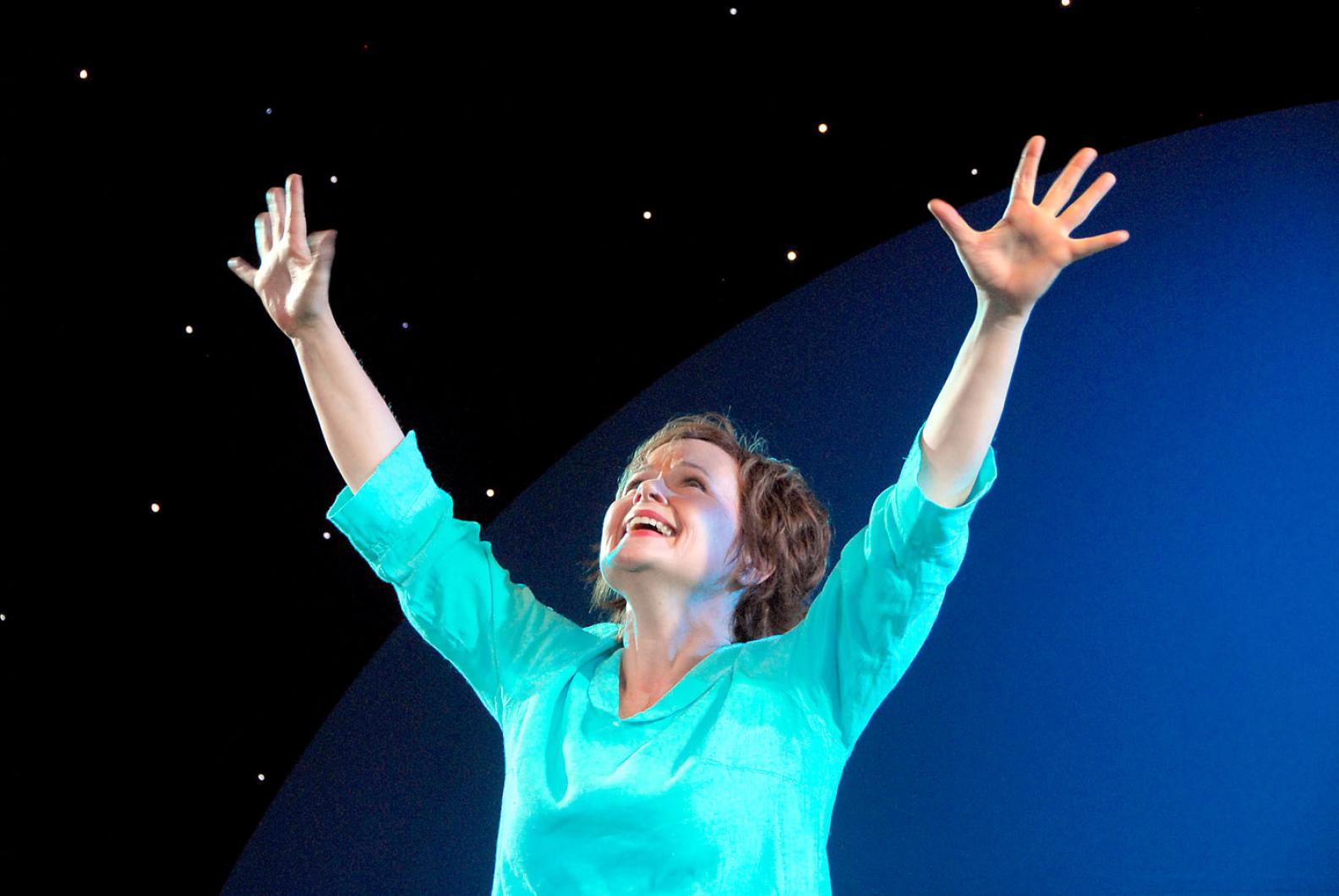There’s an old Rabbinic saying that in every generation we are Adam and Eve in Eden, able to begin again. Considering the current state of global affairs, we can certainly take heart that, like the original couple, we too can survive the Fall with grace and optimism. No less an inspiration than the American master of humor himself, Mark Twain, has provided us with a life lesson worth heeding.
The two-character play drawn from Mark Twain’s Diaries of Adam and Eve is now on stage at the Vineyard Playhouse.
The war between the sexes didn’t start with Tracy and Hepburn. In his facetious twin diaries, penned more than 10 years apart, Twain satirized the power struggle that invariably sustains any great romance. The evolution of the two diaries is a telling story in itself. The original Adam’s Diary, written in 1893, unabashedly presents the male point of view. Composed at the height of Twain’s popularity, and flourishing crude “cave drawings,” the story hints at the author’s relationship with his under-appreciated wife: Adam, and assuredly Twain himself, are reluctant to share their respective paradises with creatures who appear to be entirely foreign species.
Much of the wry humor comes from Adam’s grumbling response to Eve’s joyous discovery of their shared world. Everything fascinates Eve — the moon and the stars, Earth’s creatures and landscape, but she is especially enthralled by her grudging companion, Adam.
By the time Eve’s Diary was written, featuring a refreshingly open-eyed (and open-mouthed) heroine, and rich with lush illustrations, Twain was mourning the death of his wife. It’s a eulogy to the woman whose finer points he may not have fully appreciated in life, although their union produced four children and lasted several decades.
Adam, played by Peter Howard, admires Eve, played by Margaret Daly, aesthetically — as something pleasurable to gaze upon — but hardly shares her boundless sense of wonder. The first man is content to play in paradise and enjoy its bounty without questioning the hows and the whys, even when the most obvious why — why are we here? — would seem a natural point of curiosity to the sole inhabitants of earth.
Writer and director Joann Green Breuer has masterfully combined the two diaries into a running dialogue — of sorts.
The two leads never actually address one other. Given that the texts of the two works comprise the spoken play, yet the two players literally never appear together in Twain’s distinct diaries, the pair does relate to one another as they voice their yearnings, anxieties, interests and pleasures in the daily fabric of their lives. A monologue presents the toughest challenge in any play. An entire script of monologues might test the most accomplished actors. Howard and Daly, both seasoned stage actors, with television and film roles to their credit, handle this difficult task with seeming ease. The humorous portraits are staged in such a way that the result is pure effortless eloquence, both in what is said and left unsaid.
To create a stage production from the two disparate journals, Breuer cleverly creates two ongoing dramas that interweave and involve us in the action. The set, with fanciful props (including a makeshift Falls and an interesting menagerie) and the starry sky and moon/sun lighting effects, really become the rest of the cast — filling Adam and Eve’s paradise with sensory impact that helps the audience appreciate Eve’s sense of inquisitive wonder. It’s easy too for a Vineyard audience to revel, along with the disarmingly optimistic Eve, on her good fortune to be a resident in her own private garden wonderland.
As always, the playhouse, under the artistic direction of M.J. Munafo, presents a masterful production, including a charming stage design featuring Peggy Turner Zablotny’s fantastical floral panels to represent paradise on earth. The opening night audience laughed and savored the full hour and a half performance, clearly uplifted by the wit and wisdom of the granddaddy of American humor, the incomparable Mark Twain.
Set design is by Stephen Zablotny, lighting by Fred J. Hancock, sound by Jim Hancock, costumes by Noavakay Wibel, stage management by Timothy Toothman.
The Diary of Adam and Eve — the original love story, possibly the universal love story, and probably Mark Twain’s own personal love story — is an entertaining and moving drama that anyone can and should enjoy. At the Vineyard Playhouse through Saturday, Sept. 6.






Comments
Comment policy »